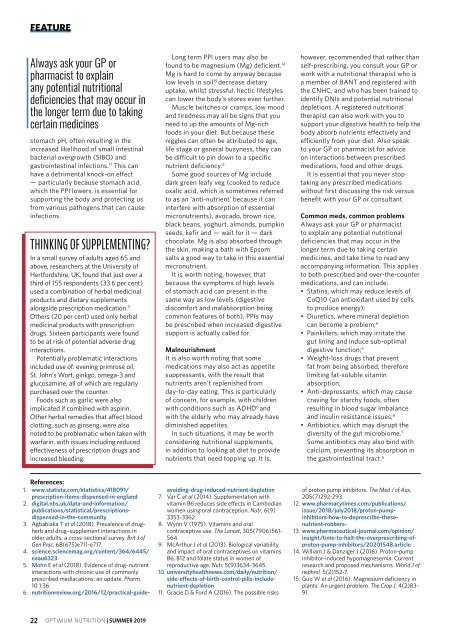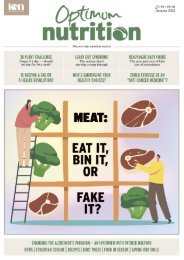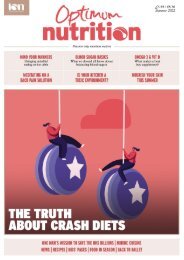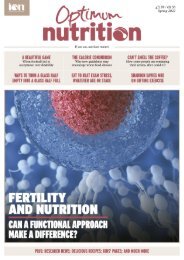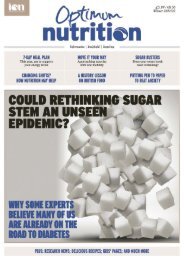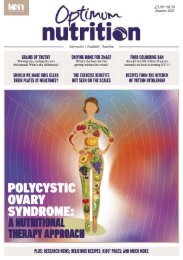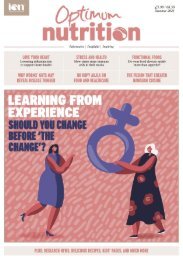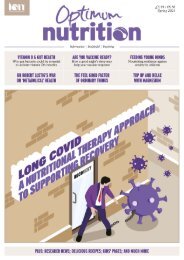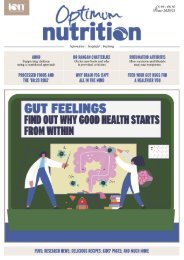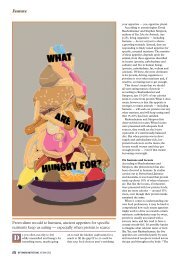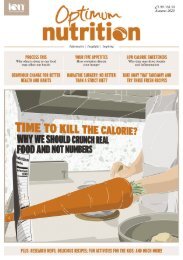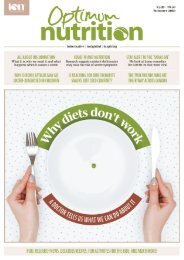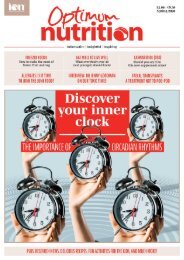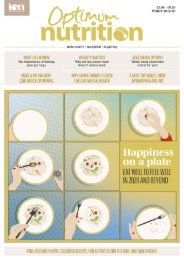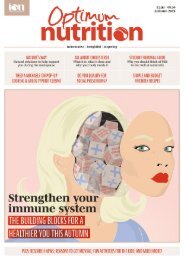Careful chemistry
Some foods can cause problems with prescription and over-the-counter medications. Sally Parr looks at what to watch out for and explains why we should always read the small print
Some foods can cause problems with prescription and over-the-counter medications. Sally Parr looks at what to watch out for and explains why we should always read the small print
You also want an ePaper? Increase the reach of your titles
YUMPU automatically turns print PDFs into web optimized ePapers that Google loves.
FEATURE<br />
Always ask your GP or<br />
pharmacist to explain<br />
any potential nutritional<br />
deficiencies that may occur in<br />
the longer term due to taking<br />
certain medicines<br />
stomach pH, often resulting in the<br />
increased likelihood of small intestinal<br />
bacterial overgrowth (SIBO) and<br />
gastrointestinal infections. 11 This can<br />
have a detrimental knock-on effect<br />
— particularly because stomach acid,<br />
which the PPI lowers, is essential for<br />
supporting the body and protecting us<br />
from various pathogens that can cause<br />
infections.<br />
THINKING OF SUPPLEMENTING?<br />
In a small survey of adults aged 65 and<br />
above, researchers at the University of<br />
Hertfordshire, UK, found that just over a<br />
third of 155 respondents (33.6 per cent)<br />
used a combination of herbal medicinal<br />
products and dietary supplements<br />
alongside prescription medication. 3<br />
Others (20 per cent) used only herbal<br />
medicinal products with prescription<br />
drugs. Sixteen participants were found<br />
to be at risk of potential adverse drug<br />
interactions.<br />
Potentially problematic interactions<br />
included use of: evening primrose oil,<br />
St. John’s Wort, ginkgo, omega-3 and<br />
glucosamine, all of which are regularly<br />
purchased over the counter.<br />
Foods such as garlic were also<br />
implicated if combined with aspirin.<br />
Other herbal remedies that affect blood<br />
clotting, such as ginseng, were also<br />
noted to be problematic when taken with<br />
warfarin, with issues including reduced<br />
effectiveness of prescription drugs and<br />
increased bleeding.<br />
Long term PPI users may also be<br />
found to be magnesium (Mg) deficient. 14<br />
Mg is hard to come by anyway because<br />
low levels in soil 15 decrease dietary<br />
uptake, whilst stressful, hectic lifestyles<br />
can lower the body’s stores even further.<br />
Muscle twitches or cramps, low mood<br />
and tiredness may all be signs that you<br />
need to up the amounts of Mg-rich<br />
foods in your diet. But because these<br />
niggles can often be attributed to age,<br />
life stage or general busyness, they can<br />
be difficult to pin down to a specific<br />
nutrient deficiency. 5<br />
Some good sources of Mg include<br />
dark green leafy veg (cooked to reduce<br />
oxalic acid, which is sometimes referred<br />
to as an ‘anti-nutrient’ because it can<br />
interfere with absorption of essential<br />
micronutrients), avocado, brown rice,<br />
black beans, yoghurt, almonds, pumpkin<br />
seeds, kefir and — wait for it — dark<br />
chocolate. Mg is also absorbed through<br />
the skin, making a bath with Epsom<br />
salts a good way to take in this essential<br />
micronutrient.<br />
It is worth noting, however, that<br />
because the symptoms of high levels<br />
of stomach acid can present in the<br />
same way as low levels (digestive<br />
discomfort and malabsorption being<br />
common features of both), PPIs may<br />
be prescribed when increased digestive<br />
support is actually called for.<br />
Malnourishment<br />
It is also worth noting that some<br />
medications may also act as appetite<br />
suppressants, with the result that<br />
nutrients aren’t replenished from<br />
day-to-day eating. This is particularly<br />
of concern, for example, with children<br />
with conditions such as ADHD 6 and<br />
with the elderly who may already have<br />
diminished appetites.<br />
In such situations, it may be worth<br />
considering nutritional supplements,<br />
in addition to looking at diet to provide<br />
nutrients that need topping up. It is,<br />
however, recommended that rather than<br />
self-prescribing, you consult your GP or<br />
work with a nutritional therapist who is<br />
a member of BANT and registered with<br />
the CNHC, and who has been trained to<br />
identify DNIs and potential nutritional<br />
depletions. A registered nutritional<br />
therapist can also work with you to<br />
support your digestive health to help the<br />
body absorb nutrients effectively and<br />
efficiently from your diet. Also speak<br />
to your GP or pharmacist for advice<br />
on interactions between prescribed<br />
medications, food and other drugs.<br />
It is essential that you never stop<br />
taking any prescribed medications<br />
without first discussing the risk versus<br />
benefit with your GP or consultant.<br />
Common meds, common problems<br />
Always ask your GP or pharmacist<br />
to explain any potential nutritional<br />
deficiencies that may occur in the<br />
longer term due to taking certain<br />
medicines, and take time to read any<br />
accompanying information. This applies<br />
to both prescribed and over-the-counter<br />
medications, and can include:<br />
• Statins, which may reduce levels of<br />
CoQ10 (an antioxidant used by cells<br />
to produce energy);<br />
• Diuretics, where mineral depletion<br />
can become a problem; 6<br />
• Painkillers, which may irritate the<br />
gut lining and induce sub-optimal<br />
digestive function; 5<br />
• Weight-loss drugs that prevent<br />
fat from being absorbed, therefore<br />
limiting fat-soluble vitamin<br />
absorption;<br />
• Anti-depressants, which may cause<br />
craving for starchy foods, often<br />
resulting in blood sugar imbalance<br />
and insulin resistance issues; 6<br />
• Antibiotics, which may disrupt the<br />
diversity of the gut microbiome. 5<br />
Some antibiotics may also bind with<br />
calcium, preventing its absorption in<br />
the gastrointestinal tract. 6<br />
References:<br />
1. www.statista.com/statistics/418091/<br />
prescription-items-dispensed-in-england<br />
2. digital.nhs.uk/data-and-information/<br />
publications/statistical/prescriptionsdispensed-in-the-community<br />
3. Agbabiaka T et al (2018). Prevalence of drug–<br />
herb and drug–supplement interactions in<br />
older adults: a cross-sectional survey. Brit J of<br />
Gen Prac, 68(675)e711-e717.<br />
4. science.sciencemag.org/content/364/6445/<br />
eaau6323<br />
5. Mohn E et al (2018). Evidence of drug–nutrient<br />
interactions with chronic use of commonly<br />
prescribed mediacations: an update. Pharm,<br />
10 1:36.<br />
6. nutritionreview.org/2016/12/practical-guide-<br />
avoiding-drug-induced-nutrient-depletion<br />
7. Var C et al (2014). Supplementation with<br />
vitamin B6 reduces side effects in Cambodian<br />
women using oral contraception. Nutr, 6(9)<br />
3353-3362.<br />
8. Wynn V (1975). Vitamins and oral<br />
contraceptive use. The Lancet, 305(7906)561-<br />
564.<br />
9. McArthur J et al (2013). Biological variability<br />
and impact of oral contraceptives on vitamins<br />
B6, B12 and folate status in women of<br />
reproductive age. Nutr, 5(9)3634-3645.<br />
10. universityhealthnews.com/daily/nutrition/<br />
side-effects-of-birth-control-pills-includenutrient-depletion<br />
11. Gracie D & Ford A (2016). The possible risks<br />
of proton pump inhibitors. The Med J of Aus,<br />
205(7)292-293.<br />
12. www.pharmacytimes.com/publications/<br />
issue/2018/july2018/proton-pumpinhibitors-how-to-deprescribe-thesenutrient-robbers-<br />
13. www.pharmaceutical-journal.com/opinion/<br />
insight/time-to-halt-the-overprescribing-ofproton-pump-inhibitors/20201548.article<br />
14. William J & Danziger J (2016). Proton-pump<br />
inhibitor-induced hypomagnesemia: Current<br />
research and proposed mechanisms. World J of<br />
nephrol, 5(2)152-7.<br />
15. Guo W et al (2016). Magnesium deficiency in<br />
plants: An urgent problem. The Crop J, 4(2)83-<br />
91.<br />
22 OPTIMUM NUTRITION | SUMMER 2019


